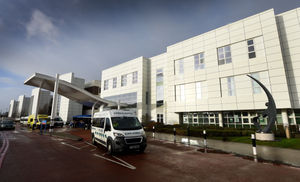NHS crisis: Bed shortage signals winter of discontent
Lengthy waiting times, queuing ambulances, no spare beds and cancelled operations – the start of 2018 has seen the region's hospitals under unprecedented levels of pressure.

And while Theresa May insists the NHS is better prepared for the winter 'than ever before', the statistics tell a very different story.
The latest official figures on the number of beds that were free at hospitals in the West Midlands in the week before Christmas show the true extent of the NHS crisis.
Like many other hospitals, Walsall Manor has warned people that they face a lengthy wait if they attend its A&E department with anything other than a life threatening condition.
It had one of the highest bed occupancy rates in the country in December, with standard beds completely full for 26 of the 35 nights leading up to Christmas.
COMMENT: Give cash to NHS not foreign aid
And the hospital had no free critical care beds for two days in the week before Christmas.
Dudley's Russells Hall Hospital had none of its critical care beds free for five of the seven days from December 18, while at Wolverhampton's New Cross Hospital the occupancy rate was 78.6 per cent, with just six out of the 28 beds free.
Sandwell and West Birmingham Hospitals NHS Trust also felt the pressure, with never more than 20 per cent of its beds available.
University Hospitals of North Midlands NHS Trust (UHNMT), which runs Royal Stoke Hospital and County Hospital in Stafford, has the most critical care beds at its disposal.
But again, availability was low with no more than 20 per cent of the beds free over the period.
It was the same story for neo-natal care over the week.
At New Cross Hospital, the hospital's 14 neo-natal care beds were full on three days in the week up to December 25.
NHS figures also show that ambulances arriving at hospitals with emergency patients are being forced to wait to hand them over.
On Christmas Eve at New Cross Hospital 83 out of the 132 ambulances arriving were delayed by between 30 and 60 minutes, with one delayed by more than an hour.
At Walsall's Manor Hospital, five out of 104 ambulances were delayed by between 30 minutes and an hour.
And at Sandwell and West Birmingham Hospitals NHS Trust, which runs Sandwell General Hospital, 10 out of the 150 ambulances arriving were delayed.
Bosses at the same trust admitted that the emergency department's performance had 'sharply deteriorated' during December.
Meanwhile at UHNMT, 10 out of 161 ambulances delayed by between 30 min and an hour.
Bosses at NHS England hope they can ease the burden on our hospitals by cancelling operations up until the end of January.
The Prime Minister said she recognised that this was disappointing and frustrating for affected patients, and pledged operations would be rescheduled 'as soon as possible'.
Mrs May said: ''The NHS has been better prepared for this winter than ever before, we have put extra funding in.
''There are more beds available across the system, we've reduced the number of delayed discharges of elderly people who would otherwise have been in NHS beds rather than in social care.
''But I recognise for those people that have had their operations postponed this is disappointing, it's frustrating
''We will ensure that those operations are put back as soon as possible and once again I say that NHS staff are doing a fantastic job.''
Her comments were met with disdain by Labour, with shadow health secretary Jonathan Ashworth, Labour's shadow health secretary accusing the Prime Minister of being 'entirely out of touch'.
"The reality is we see hospitals at full capacity, ambulances backed up, cancelled operations and patients waiting for hours on trolleys," he said.
"Instead of burying her head in the sand Theresa May needs to explain why she has allowed underfunding and cuts to health and social care to continue."
Tory MP Sarah Wollaston, who chairs the health select committee, urged ministers to 'get a grip' on the situation, which she said people whose operations had been cancelled would describe as a crisis.
The former GP called for an urgent increase in funding.
"We do definitely need a better long term sustainable plan for how we're going to get the right amount of funding into both health and social care," she said.
She said the system was 'running at absolutely full stretch across both health and social care' and 'despite all the planning that we've heard about.... I'm afraid there are serious issues with capacity'.
There had, she said, been 'far too many bed closures' and 'probably not enough money' had been spent over the years to 'keep up with the sheer scale of the increase in demand and complexity'.
Health Secretary Jeremy Hunt has apologised to those affected by cancelled operations.





